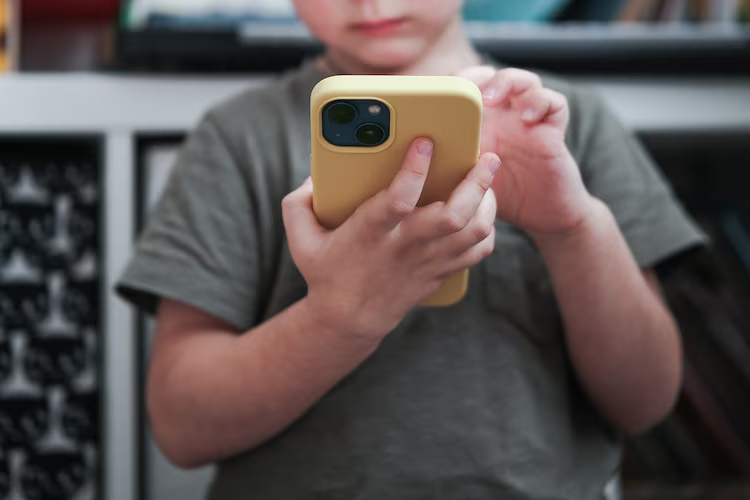As smartphone use in children becomes increasingly common, mental health experts and educators are raising alarms about its long-term effects. Mounting evidence suggests that giving smartphones to kids too early can lead to emotional, psychological, and behavioral issues. A new study published in the Journal of Human Development and Capabilities shows how children—especially girls—who own smartphones before the age of 13 are more likely to experience worse mental health outcomes later in life.
Key Findings on Smartphone Use and Mental Health
Researchers analyzed self-reported mental health data from over 100,000 individuals aged 18 to 24. Participants answered questions about symptoms such as aggression, detachment, hallucinations, and suicidal ideation. The results were alarming:
- Earlier smartphone ownership correlated with worse mental health outcomes.
- Girls given smartphones before age 13 reported lower self-image, emotional resilience, and confidence.
- Boys reported feeling less calm, stable, and empathetic.
- Among young women who had smartphones by ages 5 or 6, 48% reported severe suicidal thoughts, compared to 28% who received their phones after age 13.
- In young men, 31% of early smartphone users reported suicidal thoughts versus 20% among those who received phones later.
These findings emphasize the growing concern over smartphone use in children and its potential for lasting psychological effects.
Dr. Tara Thiagarajan, one of the lead authors, noted, “The younger the child gets a smartphone, the more exposure to all this impacts them psychologically and shapes the way they think and view the world.”
Why Early Smartphone Use Harms Mental Health
The study identified several contributing factors to poor mental health outcomes in children who start using smartphones early:
- Social media exposure
- Cyberbullying
- Disrupted sleep
- Weakened family relationships
Girls were found to be more emotionally affected—likely due to greater social media engagement, constant comparison, and the emotional toll of online validation cycles. The increase in smartphone use in children has amplified these risks significantly over the past decade.
Smartphone Use in Children: Expert Guidelines for Parents
With growing awareness about the mental health effects of smartphone use in children, experts have issued several recommendations to help mitigate the damage:
- Delay smartphone ownership until at least age 14
- Limit or delay social media access until age 16
- Create phone-free school environments
- Educate children on digital literacy and safe online behavior
- Hold tech companies accountable for child-targeted content
Dr. Tara Narula of ABC News advised, “The longer we can push off allowing our kids to be on social media, we are learning, the better.” For communication without online distractions, flip phones or basic call devices are useful alternatives.
The Role of Parents in Managing Smartphone Use in Children
Pediatricians, such as Dr. Natasha Burgert, highlight the importance of parental role modeling. She advises, “Children watch everything you do. Connect meaningfully every day, and show your children that real-life interactions matter more than digital ones.”
Parents play a vital role in how smartphone use in children evolves. Setting clear rules, being emotionally available, and prioritizing family interactions can help reduce dependency and emotional instability linked to excessive device use.
Promoting Healthy Digital Habits
The American Academy of Pediatrics (AAP) offers the 5 C’s of media use as a guideline for developing healthier tech habits in children:
- Child – Understand your child’s personality and how they respond to media.
- Content – Choose age-appropriate, positive, and educational content.
- Calm – Encourage emotional regulation beyond media stimulation.
- Crowding Out – Invest time in screen-free activities such as hobbies, outdoor play, or family conversations.
- Communication – Regularly discuss your child’s media experiences and promote digital literacy.
Teaching children to navigate technology responsibly is key to minimizing the mental health toll of smartphone use in children.
Frequently Asked Questions (FAQs)
1. What is the ideal age for a child to get a smartphone?
Experts suggest waiting until age 14 to introduce smartphones and age 16 for social media, helping prevent mental health problems linked to smartphone use in children.
2. How does early smartphone use affect children’s mental health?
Early smartphone use in children is associated with higher risks of depression, anxiety, suicidal thoughts, and decreased emotional resilience.
3. Are girls more affected by smartphone use than boys?
Yes. The study shows girls are more emotionally impacted by smartphone use in children, due to factors like social comparison, body image concerns, and cyberbullying.
4. Should schools ban phones?
Yes. Many experts support phone-free schools to enhance focus and reduce the negative impacts of smartphone use in children.
5. What are alternatives to smartphones for young kids?
Parents can choose flip phones, basic phones, or monitored tablets to allow communication without the risks associated with smartphone use in children.



